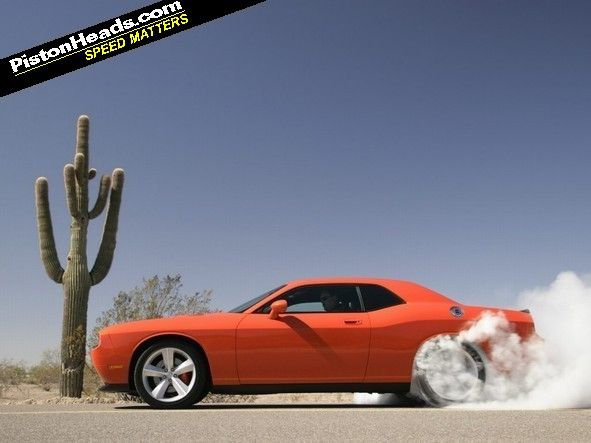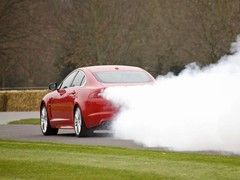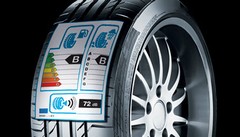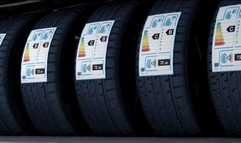The PH guide to the EU's new tyre labels
Regulations from Europe mean the way tyres are sold will change later this year. All new tyres will have to carry a label to show how good (or bad) they are...

Tyre labels will, sadly, say nothing about burnoutability
The way we buy tyres is about to change. Eco-rules from Europe mean tyres are gaining labels just like the ones on washing machines and fridges. Anyone selling new tyres will have to show customers the label for the tyre they're about to buy.
However, when most of us buy tyres it's all about the grip, so that you can stop, go and turn (often quickly), rather than causing as little damage as possible to the environment. So, the EU powers-that-be have also put some grip information on the new labels. How nice of them.
So the new labels, which will start appearing in June this year and will become mandatory from November, will carry information about three things: rolling efficiency, noise and wet braking.
The idea behind this is to give consumers a 'better' way of judging the quality of a tyre rather than just price and magazine tyre tests. The label creates a level playing field for all tyre manufacturers thanks to scientific test conditions for the three areas on the label.
The ethos behind the labels is all very worthy, but, as we all know, PHers are a little more concerned about the rubber on their metal than the average A-to-B driver.
What it all means
The 'best' performing tyres in the three tests will score two 'A' ratings plus a single black mark and a low number for noise.
Rolling resistance
Many eco-cars, such as the VW Bluemotions and Skoda Greenlines, have deliberately low rolling resistance tyres fitted so that tyres take less energy to propel them on the road.
The grades run from A to G, with D not being used to accentuate the difference between good and bad tyres.
If you want to get technical, the difference between each grade means a reduction or increase in fuel consumption of between 2.5 per cent and 4.5 per cent. That's a difference of about half an mpg for a 36mpg car per grade.
Wet braking
Wet grip, as you could guess, relates to the tyre's ability to stop a vehicle on wet roads and can be expressed in terms of distance. The grades used for this test are A to G, again with D not being used in order to show greater differences*.
The difference between each grade means an increase or decrease in stopping distance of between one and two car lengths (between three and six metres) when using maximum braking from 50mph.
* Actually G isn't used either, because that would be below the minimum legal standards for a new tyre.
Noise
This is the external noise made by the tyre and is measured in decibels. The more black bars shown on the label, the louder the tyre.
But wait...
Sounds simple enough, doesn't it? The label will tell you some limited, but useful, information about your next set of tyres. Although you'll probably get more detailed performance information about things like dry braking, cornering grip, cold weather traction and so on, by reading a tyre test.
There is a final twist in the new regulations, however, because the rules apply whenever the consumer has a choice of new tyre, this also includes almost all new car sales. To put it a different way, if when you buy a new car there is a choice of wheel size (and therefore different rubber) the dealer will have to show you the labels for the tyres before you pay for the car.
Normally when you buy a new car you have no choice and little idea what brand of rubber will arrive. This is despite the fact that, when you order a new car, even without changing wheel size, it could arrive on one of four or five tyre brands due to the way car makers work supply agreements with tyre manufacturers.
So what'll happen?
By November 2012 one of two things will therefore happen with new car sales and tyre choice.
The first is that buyers will be able to select which type of tyre they want on their new car and be shown a choice of labels. The second option is that car manufacturers will insist all tyres for a particular model of car have the exact same scores on the eco-label.
With the implementation of the new rules not due for several months, experts say this last point could go either way. However, the labelling should at least give a level playing field and a start-point for tyre choice, much in the same way that 0-60mph figures don't tell the whole story about a car's performance, but do give a useful indication.
Why do they keep making things more and more complicated?
What issue is there with going to a local tyre dealer, and just buying the tyre that suits you best?
I bet the retailers are p1ssed off with this, as well as the manufacturers (especially, alot of the budget brands like Wanli / Linglong), which people would probably refrain from buying due to poor rating scores!
Or even to know why you should go for a SportContact III over an Eagle F1 or a PilotSport based on what you want from a tyre and how they perform under those criteria? Tyres will actually become better because of this just like cars became safer when EuroNCAP was established and more economical when the European Driving Cycle test was established. Choice is good and an informed consumer forces manufacturers to up their game. The free market only works when there's competition.
It'll be a bit of a hassle for manufacturers and dealers to start with but that always happens when things change. In no time at all, it'll be par for the course; everyone will adapt and get used to it and we will laugh when we think about all those people who used to have to make the decision "back in the day" without any information to base their choice on.
It'll be like, "remember when seatbelts/ABS/ESP were only available if you paid extra for them?"
With most everyday cars people are more concerned about cost and wear rates (ie cost per mile). Is wear rate info shown on the tyres to allow comparison of long term costs for different tyres? If not, why not? During this current faffing around it would have been a good time to add this useful info.
I bet the retailers are p1ssed off with this, as well as the manufacturers (especially, alot of the budget brands like Wanli / Linglong), which people would probably refrain from buying due to poor rating scores!
For the cheap, knock-off tyres it's a good thing - they'll have to improve quality to sell tyres to discerning buyers, or they'll still target the cheap-as-possible crowd and not give a toss.
Why do they keep making things more and more complicated?
What issue is there with going to a local tyre dealer, and just buying the tyre that suits you best?
I bet the retailers are p1ssed off with this, as well as the manufacturers (especially, alot of the budget brands like Wanli / Linglong), which people would probably refrain from buying due to poor rating scores!
It always worries me when people choose their tyres solely because they were the cheapest available, not the best they could afford.
 k all about tyres. However, I do think more emphasis should be placed on grip rather than mpg, as I can see everybody who doesn't know just choosing the slipperiest tyre possible
k all about tyres. However, I do think more emphasis should be placed on grip rather than mpg, as I can see everybody who doesn't know just choosing the slipperiest tyre possible  I would guess that around here at least well over 80% of cars more than a few years old are on mismatched tyres and normally some 'exotic' sounding brand, people just don't get the importance of them.
I would guess that around here at least well over 80% of cars more than a few years old are on mismatched tyres and normally some 'exotic' sounding brand, people just don't get the importance of them. See why it doesn't work?
You can't measure everything, it is impractical and in some circumstances impossible.
Look at performance/target orientated policing. It does not work.
I must admit though laughter ensued reading the article when I got to the letter D not getting used for the rolling resistance. When I then read both D and G where pointless in the Wet Stopping part I did start to wonder who thought some of these processes up.
Gassing Station | General Gassing | Top of Page | What's New | My Stuff







